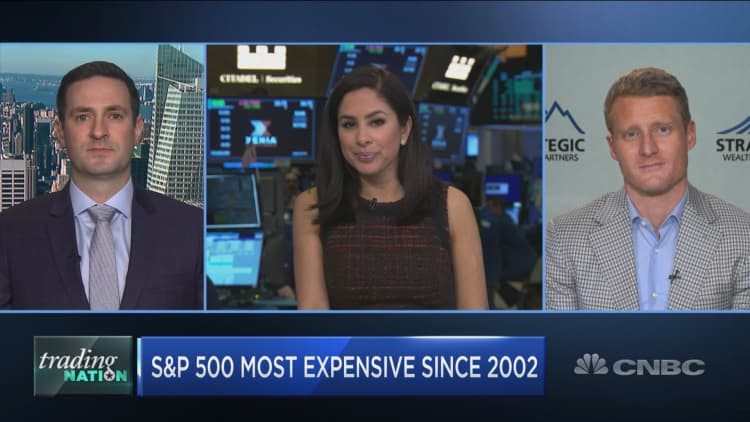
Stocks are holding near record highs, keeping the S&P 500 at its highest valuation since 2002, but the market looked a lot different back then.
Around 20% of the S&P 500 is now made up of five technology companies — Apple, Google parent Alphabet, Facebook, Microsoft and Amazon.
Eighteen years ago, one-fifth of the index was made up of 10 companies as diverse as Walmart, Exxon Mobil and Pfizer.
One top trader says the difference between then and now is staggering.
"The market cap in the entire [small-cap] Russell 2000 is $2.4 trillion. The market cap of Microsoft and Apple is $2.8 trillion. I mean, there is absolutely no doubt the big boys are leading the charge right now," Mark Tepper, president of Strategic Wealth Partners, said Wednesday on CNBC's "Trading Nation."
That stock leadership is clear when comparing the broad market-cap weighted S&P 500 with the RSP equal-weight S&P 500 ETF, he said. While the S&P 500 has risen nearly 5% this year, the RSP ETF is up by just over 2%.
Investors should look to another corner of the market to justify high valuations, Tepper said.
"If you're just looking at the P-E ratio, yeah it's high compared to historical averages, but you really need to look at them relative to other asset classes like bonds," he said. "Take the earnings yield on the S&P minus the 10-year Treasury yield. That right now is over 300 basis points and when that's the case historically, 12 month forward returns on the S&P 500 are over 12%. So, I think high P-E ratios, given low interest rates, are the new normal."
JC O'Hara, chief market technician at MKM Partners, agreed that high valuations aren't a major concern right here — though he does see worrying signs in the market leadership.
"Maybe you can say they're not as cheap as they were a few years ago. I wouldn't say they're expensive. But, the issue or concern for me is towards the end of bull markets, what happens is you start to see money start chasing the large market-cap leaders," O'Hara said during the same segment.
"We call them, from a technical perspective, the market generals, and right now we're really seeing the market generals like we saw back in 2000 heading into 2002, that correction. The market generals are gaining more and more influence and are growing stronger and stronger, which creates a feedback loop and more and more money is chasing them," said O'Hara.
Like in the early 2000s, O'Hara warns that the top stocks could be going parabolic, adding: "When we get too crowded in a few select names, that's where a technician becomes concerned."
Apple, Amazon, Microsoft, and Alphabet are all up at least 10% this year. The only laggard is Facebook, up 4%.
Note: an incorrect headline stating "cheapest market" has been corrected.





